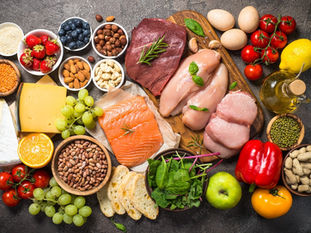

Gut Health: Fibre, IBD, IBS and poo insights
Sep 7, 2024
2 min read
0
21
0
Let’s dive into the fascinating world of fibre, IBD (inflammatory bowel disease), IBS (irritable bowel syndrome), and the mysteries of our poo! There are two types of fibre foods, Soluble fibre like oats, beans, and fruits, dissolves in water and supports gut health. Insoluble fibre, present in whole grains and vegetables, add bulk to stool and promote regular bowls movement. In this article we’ll explore how these fibres affect conditions like IBD and IBS, and why paying attention to your poo matters!

IBD and Fibre
IBD includes two conditions: Crohn’s disease and Ulcerative colitis. It causes chronic inflammation in the digestive system and other parts of the body then the immune system mistakenly attacks the intestines, leading to physical damage. IBD can affect area beyond the intestines, such as the skin, joints and eyes.
A low intake of fibre increases the risks of developing Crohn’s disease, Ulcerative colitis, and even colorectal cancer. If people with IBD consume adequate amount of fibre they are 40% less likely to experience flare-ups compared to those avoiding high-fibre foods. The role of fibre is to fuel beneficial gut bacteria and promote the production of Butyrate. Butyrate is a naturally accruing fatty acid in our body that has anti-inflammatory properties and helps to repair damage in the digestive tract. During remission aim for normal, healthy, and balanced diet, include foods from 5 groups, potatoes, bread, and cereals as well as fruit and vegetables.
IBS and Fibre
IBS is not a disease but a syndrome, it does not involve inflammation and its symptoms include abdominal pain, cramps, and changes in bowel movements. Unlike IBD, IBs doesn’t threaten overall health or cause physical symptoms elsewhere in the body. No specific fibre or diet can cause, prevent, or cure IBS, however, increasing dietary fibre can help manage IBS symptoms.
Finding the right balance in very important, too much soluble, highly fermentable fibre can cause bloating, abdominal pain and flatulence, Too little fibre intake may contribute to IBS and constipation. Recommended fibre is to aim for 20-35 grams of soluble and nonfermentable fibre for people with IBS. Following FODMAP diet can help managing symptoms of IBS, by limiting certain types of carbohydrates.
Remember, individual tolerance varies, so consulting a healthcare professional or dietitian is essential for personalised guidance.
Understanding our Poo
Bristol stool chart is a handy tool to assess stool consistency, it ranges from type 1 (hard lumps) to type 7 ( watery). Type 1-2 shows constipation, 3-4, Ideal, healthy stools and 5-7 Diarrhoea.
Colour and Frequency
Brown poo is counted as normal, Green implies rapid transit through the intestines, black indicate bleeding (Consult a doctor) and pale/yellow possible liver or gallbladder issues.
Frequency of the stool varies from going daily to every few days, sasabut consistency and comfort matters more than frequency.
Having said all above, everyone’s gut is unique! If you have concerns, consult a healthcare professional.



